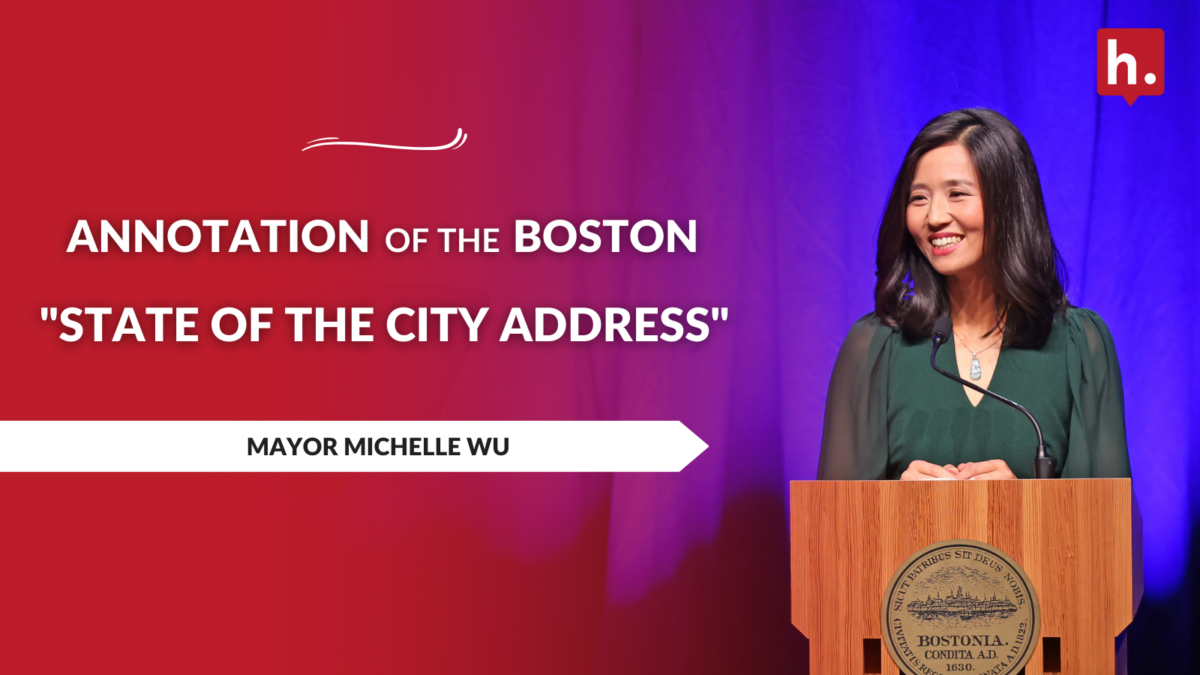For Mayor of Boston Michelle Wu, it was time to pull back the curtain.
As the Mayor planned to deliver her first State of the City address in January 2023, she hoped to avoid some of the limitations of such speeches: ideas and facts presented without the context necessary to communicate them clearly — and make them meaningful to the audience.
The Mayor’s Office of New Urban Mechanics (MONUM) helped her achieve these goals. Together, they saw an opportunity: give Boston residents a behind-the-scenes look at the issues at play in their city by annotating the mayor’s State of the City remarks.
“With some added context, we hoped to give the public a clearer and more complete picture of plans and resources the Mayor discussed,” says Michael Evans, Program Director at the Mayor’s Office of New Urban Mechanics.
Why the Boston Mayor’s Office chose Hypothesis
The MONUM team set out to find a tool that would enable them to share an annotated version of the mayor’s speech with the public.
When evaluating potential solutions, the team wanted a tool that allowed their annotations to appear directly alongside the mayor’s official remarks. “When your goal is to build understanding, it’s important for the context you’re providing to be as close as possible to the source material,” says Maddie Webster, Program Manager at the Mayor’s Office of New Urban Mechanics.
Hypothesis, a social annotation tool, promised MONUM the chance to bring context and content closer together. “Hypothesis overlays discussion right onto the text of the speech, which is exactly what we were looking for,” says Michael.
The team also sought to find a tool that was easy to use — another Hypothesis hallmark.
“It’s plug and play,” Michael says of Hypothesis. “We felt that it would let our audience focus on the speech, not the tool itself.”
Implementing Hypothesis
As the team prepared for the address, it recognized a need to tailor Hypothesis’s configuration for their unique situation.
For this first foray into annotation, the team wished to specify who could engage with the speech’s annotations. The Hypothesis Success team partnered with MONUM to set up the appropriate level of permissions.
“They were so responsive and accommodating,” says Maddie. “They gave us confidence that everything would go smoothly.”
Results
By annotating the annual State of the City address for the public, the Boston Mayor’s Office achieved its goals of communicating in a clearer, more open way with its constituents.
“We were able to bring in behind-the-scenes anecdotes from some of the City employees behind several of the initiatives the Mayor mentioned in her speech,” said Maddie.
The team’s use of Hypothesis drew applause — from the public, from the Mayor’s director of speechwriting, Ezra Baeli-Wang, and from several City employees who were quoted in the annotations. As a result, the team is looking forward to using Hypothesis for their future speeches.
Ready to give students a whole new way to engage with scholarly content? Fill out the form below to get started:
